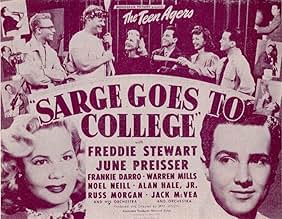Jess Stacy(1904-1995)
- Actor
- Soundtrack
Swinging, mostly self-taught stride pianist of the big band era,
initially trained on drums. The son of a railroad engineer and
well-grounded in jazz from early childhood, Stacy began his
professional career in the early 1920's. He first played on Mississippi
and Missouri riverboats with local bands (often playing the cumbersome
steam calliope), such as Peg Meyer's Original Melody Kings and groups
led by Harvey Berry (S.S. Majestic) and Tony Catalano (S.S. Capitol).
By 1926, he had made his way to Chicago, first joining Joe Kayser's
band at the Arcadia Ballroom. Over the next nine years, Stacy was
steadily employed with various orchestras, performing at night clubs
and speakeasies, at least some of which were operated by gangsters like
Al Capone. Noteworthy engagements included
bands led by trumpet player Paul Mares (at
Harry's Bar), Maurie Stein (at the Paramount Club) and
Earl 'Fatha' Hines , for whom he
often worked as a relief pianist and who strongly influenced his own
style of playing. He also made a number of recordings with guitarist
Eddie Condon and of compositions for piano
by the legendary Bix Beiderbecke.
Stacy's big break came about, when the producer John Hammond Jr
(1910-1987) put his name forward to
Benny Goodman. Signed on, he
remained with Goodman for four years and took part in the seminal
concert at Carnegie Hall, playing an improvised piano solo - subtly
prompted by Goodman himself -- in the middle of the show-stopping
number "Sing, Sing, Sing". His reputation was thus made.
Stacy was reputed to be mild-mannered, of sensitive disposition, so it came to no surprise when, in 1939, he left the volatile Goodman for Bob Crosby's Bobcats, declaring "I never want to play with Benny Goodman's band again" and "...it was too much of a strain. You just never knew where you were with Benny and I feel terribly relieved that it's all over" (p.218, George Simon "The Big Bands"). Nevertheless, after three years with Crosby, Stacy returned to Goodman, until the latter temporarily disbanded his orchestra in March 1944. This was followed by brief stints with Horace Heidt and Tommy Dorsey. In 1945, Stacy formed his own big band as a backing group for his then-wife, the jazz singer Lee Wiley, recording several sides for RCA and Commodore. Both marriage and band turned out to be short-lived. As the big band era came to an end, Stacy drifted towards the edges of the music scene. By the late 1940's, he was performing as a soloist in such West Coast bars and clubs as the Brown Derby, the Hangover and the Ile de France. After 1963, somewhat disillusioned, he gave up full-time music altogether, instead selling cosmetics and delivering mail for the Max Factor company. He was eventually tempted out of retirement for the 1974 Newport Jazz Festival, at which time he was 'rediscovered' by a new and appreciative audience.
Stacy was reputed to be mild-mannered, of sensitive disposition, so it came to no surprise when, in 1939, he left the volatile Goodman for Bob Crosby's Bobcats, declaring "I never want to play with Benny Goodman's band again" and "...it was too much of a strain. You just never knew where you were with Benny and I feel terribly relieved that it's all over" (p.218, George Simon "The Big Bands"). Nevertheless, after three years with Crosby, Stacy returned to Goodman, until the latter temporarily disbanded his orchestra in March 1944. This was followed by brief stints with Horace Heidt and Tommy Dorsey. In 1945, Stacy formed his own big band as a backing group for his then-wife, the jazz singer Lee Wiley, recording several sides for RCA and Commodore. Both marriage and band turned out to be short-lived. As the big band era came to an end, Stacy drifted towards the edges of the music scene. By the late 1940's, he was performing as a soloist in such West Coast bars and clubs as the Brown Derby, the Hangover and the Ile de France. After 1963, somewhat disillusioned, he gave up full-time music altogether, instead selling cosmetics and delivering mail for the Max Factor company. He was eventually tempted out of retirement for the 1974 Newport Jazz Festival, at which time he was 'rediscovered' by a new and appreciative audience.












